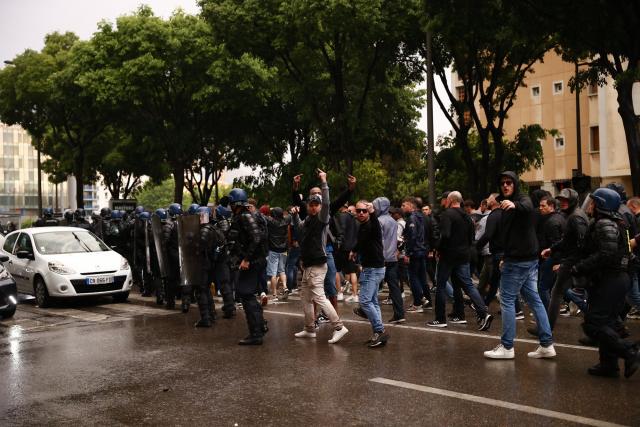Interdiction De Déplacement Feyenoord À Lille: Un Précédent Dangereux ?

Interdiction De Déplacement Feyenoord À Lille: Un Précédent Dangereux ?. Discover more detailed and exciting information on our website. Click the link below to start your adventure: Visit Best Website. Don't miss out!
Table of Contents
Interdiction de Déplacement Feyenoord à Lille: Un Précédent Dangereux?
The recent ban on Feyenoord supporters traveling to Lille for their Europa League match has sparked heated debate amongst football fans and authorities alike. This decision, unprecedented in its scale, raises serious questions about the future of fan travel and the potential for setting a dangerous precedent. Is this a necessary measure to curb escalating hooliganism, or a disproportionate response that could stifle the vibrant atmosphere integral to European football?
The Incident and its Fallout:
The ban, imposed by French authorities, followed concerns about potential violence and disorder involving Feyenoord’s notoriously fervent fanbase. While specific details surrounding the threat assessment remain partially undisclosed, the decision effectively prevented thousands of Feyenoord supporters from witnessing their team play in a crucial European fixture. This has led to widespread criticism, focusing on several key aspects:
- Disproportionate Punishment? Many argue that the blanket ban is too severe, punishing the vast majority of peaceful supporters for the actions of a small, violent minority.
- Freedom of Movement: The ban raises questions about freedom of movement for football fans within the EU, particularly concerning the rights of those who pose no threat.
- Economic Impact: The absence of Feyenoord supporters significantly impacted the local Lille economy, missing out on revenue from tourism and hospitality.
- Atmosphere at the Match: The noticeably quieter atmosphere at the stadium highlighted the crucial role away fans play in creating a vibrant and exciting match-day experience.
Setting a Dangerous Precedent:
This Lille decision has raised fears that similar bans could become commonplace throughout Europe. If authorities routinely resort to such sweeping measures, it could:
- Damage the Spirit of European Football: The passionate support of away fans is a defining characteristic of the European football experience. Curtailing this could significantly diminish its appeal.
- Increase Tensions: The feeling of being unfairly targeted might incite further unrest among supporters feeling marginalized.
- Undermine Trust in Authorities: Many fans feel the ban lacked transparency and proportionality, undermining trust between supporters and governing bodies.
Alternative Solutions and Moving Forward:
Rather than blanket bans, many suggest focusing on targeted measures to address hooliganism. These could include:
- Enhanced Intelligence Gathering: Improved intelligence and collaboration between clubs, authorities, and fan groups to identify and address potential threats.
- Stricter Penalties for Hooligans: More robust and effective sanctions for identified perpetrators of violence and disorder.
- Fan Engagement and Dialogue: Proactive dialogue between authorities and fan groups to foster a more constructive and collaborative relationship.
Conclusion: The Feyenoord supporter ban in Lille serves as a stark reminder of the challenges faced in managing football fan behavior. While ensuring safety and security is paramount, the approach taken raises serious questions about proportionality, fairness, and the long-term consequences for the vibrant culture of European football. A more nuanced, targeted, and collaborative approach is vital to preventing similar incidents and preserving the passionate atmosphere that makes European football so unique. We need a solution that balances safety with the fundamental rights of football fans. What are your thoughts? Share them in the comments below.

Thank you for visiting our website wich cover about Interdiction De Déplacement Feyenoord À Lille: Un Précédent Dangereux ?. We hope the information provided has been useful to you. Feel free to contact us if you have any questions or need further assistance. See you next time and dont miss to bookmark.
Featured Posts
-
 Caps Edge Oilers In Nail Biting 3 2 Victory
Jan 23, 2025
Caps Edge Oilers In Nail Biting 3 2 Victory
Jan 23, 2025 -
 Analisis Mendalam Real Madrid Dan Strategi Menghadapi Red Bull Salzburg
Jan 23, 2025
Analisis Mendalam Real Madrid Dan Strategi Menghadapi Red Bull Salzburg
Jan 23, 2025 -
 El Impacto Del Indulto A Ross Ulbricht Analisis Del Caso Silk Road
Jan 23, 2025
El Impacto Del Indulto A Ross Ulbricht Analisis Del Caso Silk Road
Jan 23, 2025 -
 La Faceta Desconocida De Pedro Alonso Familia Raices Y Pasiones
Jan 23, 2025
La Faceta Desconocida De Pedro Alonso Familia Raices Y Pasiones
Jan 23, 2025 -
 Inter Fenerbahce Skriniar E A Istanbul Le Ultime Notizie
Jan 23, 2025
Inter Fenerbahce Skriniar E A Istanbul Le Ultime Notizie
Jan 23, 2025
